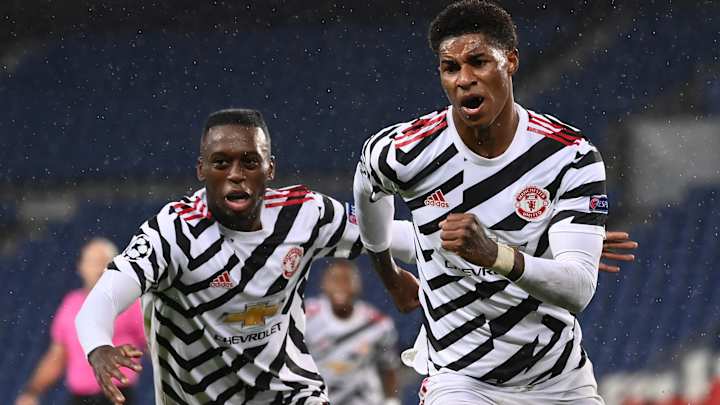Man United Reverts to Successful Script, PSG to Its Old Ways in Champions League Opener

When will Paris Saint-Germain learn? When will the $1.5 billion investment in transfer fees alone pay off? On the evidence of Tuesday's 2-1 defeat to Manchester United, no time soon. PSG, it should be said, was without a number of key players, but its faults were all too familiar for that to be much mitigation.
After reaching the final of last season's revamped Champions League two months ago, PSG reverted to appearing uninspired and sluggish, far too reliant on its brilliant individuals to perform a moment of genius. It was deservedly picked off by a well-organized Manchester United side that was in control for long spells. The group stage of the Champions League often feel like drab preamble to the real business of the knockout stage, an almost jeopardy-free ritual the wealthier sides go through to make a bit of easy money by beating up far less well-resourced teams. But this season always looked like being a little more interesting, in part because a number of superclubs are in transition, in part because the circumstances of this season have added an element of randomness and in part because of a draw that put the two best Pot 3 sides in interesting groups.
PSG and United are by some distance the wealthiest clubs in the group, but RB Leipzig reached the semifinal last season and has, in Julian Nagelsmann, arguably the brightest young coach in Europe. Even after losing Timo Werner to Chelsea, it represents a clear danger to the two grandees, and that added meaning to Tuesday’s meeting at the Parc des Princes. Leipzig should feel extremely heartened: as Nagelsman’s side was a comfortable 2-0 winner over Istanbul Basaksehir, there was nothing occurring simultaneously in Paris to cause it any concern.
Nearly 20 months ago, it was with a shocking win at PSG in the Champions League last 16 that Ole Gunnar Solskjaer secured himself Man United's manager’s job permanently. The blueprint Tuesday was very similar: a back three, two deep-lying midfielders, a low block and speed on the break. Setting up a defense to sit deep and play on the counter is something Solskjaer has proved repeatedly he can do–which is why he has achieved a disproportionate number of good results against better sides. Rather less expected, perhaps, was the excellence of Axel Tuanzebe at the heart of the defense, making his first United start since the EFL Cup win over Colchester last December.
United was helped by the diffidence of PSG, which was weirdly slow, almost lethargic, playing out from the back, particularly before halftime. Manager Thomas Tuchel has toughened the midfield, but even with three grafters at the heart of his 4-3-3, the reluctance of the front three to track back causes structural issues. United looked comfortable throughout and had the better of the PSG defense both for pace and in the air. Every corner was a threat, while Abdou Diallo had a very uncertain opening half hour. One bungled touch almost let in Marcus Rashford before he clumsily brought down Anthony Martial to concede a penalty that Bruno Fernandes converted at the second attempt.
Without ever approaching fluency, PSG was better in the second half. Kylian Mbappe jinked into the box to draw a fine save from David De Gea, and Layvin Kurzawa hit the bar, but the goal that brought PSG level was a gift. There was little pressure on Martial as he went to head away Neymar’s corner, but the ball skimmed off the side of his head and flashed into his own net.
Yet even that didn’t lift PSG. Solskjaer, having seen his lead disappear, was confident enough to bring on Paul Pogba and switch to a back four. Doubts remain about his capacities as a manager at the very highest level, but he got the big decisions right here. Then again, he has shown before a capacity to win this sort of game–indeed this precise matchup–in the past without being able to put together consistent runs.
Immediately the momentum of the game shifted again. Keylor Navas had already made one fine low save form Rashford when the 22-year-old drilled an angled drive past him from the edge of the box with five minutes remaining. For PSG, it must have been a small case of déjà vu, as it was Rashford whose stoppage-time penalty capped its ouster in the 2019 meeting between the two sides.
Marcus Rashford MBE has done it again to PSG in the Champions League! This time with a fabulous strike. 2-1! #UCL
— SI Soccer (@si_soccer) October 20, 2020
(via @TUDNUSA) pic.twitter.com/iFH9SA4qkc
The most striking moment in his goal Tuesday, though, was less the brilliance of his finish than the sight of Neymar turning away and wandering upfield as Pogba regained possession to feed Rashford.
PSG may have great players, but it plays nothing like a team.

An accomplished author of multiple books, Jonathan Wilson is one of the world’s preeminent minds on soccer tactics and history.